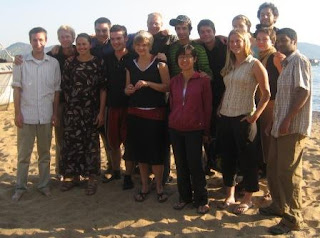
Bar at the Wheelhouse on Senga Bay
I just got back from the mid place retreat. I was great to see everyone, most of which I hadn't had any contact with over the past two months. It was also my first time to see Lake Malawi. We worked on finding solutions to challenges we are facing and creating action plans for the remainder of our time here. My main challenge with work is finding a way to shift my focus from learning to adding value at BERDO. The retreat helped me come up with three project ideas to present to BERDO.


Creating visual summaries of our placements
We had a chance to take a break and have some fun. Swimming in the lake, playing beach volleyball, hanging outwith friends, and other amusements (see picture below).
Paul wearing Anne's pants
It was also a great time to reflect on my experience here and do some big picture thinking. One question that comes up a lot for me is "What role should I play in human development?" I think I am starting see the world as much more of a global system and that "human development" is not something that is isolated to "developing" countries. A large part of the change I would like to see needs to happen in the West. Thinking about the global system, it is the unsustainable lifestyles of the west that appears to be the biggest challenge. I am not sure where I will work in the future, but I know it will be focused on the same over all goal of creating a global system that promotes sustainable quality of life for all people.
Group picture of all the JFs in Malawi and the long term volunteers in Malawi and Zambia.



















